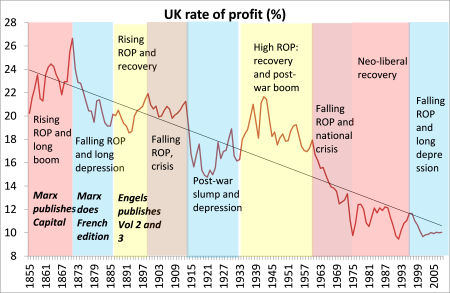Capital 150 Conference
November 2024 › Forums › General discussion › Capital 150 Conference
- This topic has 0 replies, 1 voice, and was last updated 7 years, 2 months ago by
Young Master Smeet.
Viewing 1 post (of 1 total)
-
AuthorPosts
-
September 28, 2017 at 11:09 am #85748
Young Master Smeet
ModeratorMichael Robert has blogged about an academic conference on Capital 150 years on:
https://thenextrecession.wordpress.com/2017/09/27/capital-150-part-3-struggle/
Quote:As Carchedi points out, “the first 30 years of post WW2 Us capitalist development were free from financial crises”. Only when profitability in the productive sector fell in the 1970s, was there a migration of capital to the financial unproductive sphere that during the neo-liberal period delivered more financial crises. “The deterioration of the productive sector in the pre-crisis years is thus the common cause of both financial and non-financial crises… it follows that the productive sector determines the financial sector, contrary to the financialisation thesis.”Carchedi goes on to show that it was not the lack of wage demand that caused crises or the failure to boost government spending as the Keynesians argue – of the 12 post-war crises, eleven were preceded by rising wages and rising government spending!
Quote:As Engels explained, Marx’s great discovery was the existence of surplus value as the specific driver of the capitalist accumulation and labour’s immiseration. For Marx, the production of surplus-value comes first and is logically paramount, before circulation and distribution. Production and circulation are not considered by Marx as having the same explanatory power in the analysis of capitalism. Marx is clear that production is more fundamental than circulation. As Marx says, it is the production of surplus value that is the defining character of the capitalist mode of production, not how that surplus value it is circulated or distributed at the surface level.Quote:In [Robert's] paper, I concentrated on Britain in the 150 years after Marx published Capital. I showed from Bank of England statistics how the overall rate of profit of British capital has fallen – not in a straight line because there were periods when the counteracting factors (a rising rate of surplus value and falling cost of technology) operated against the general tendency. Quote:‘Accumulation by dispossession’ (Accumulation by dispossession) or ‘profit from alienation’ i.e. cheating, fraud, price gouging; speculation against currencies etc, that DH puts forward as the main driver of class struggle now, has existed in many class societies before capitalism, and is thus part of capitalism too. But Marx’s Capital makes it clear that the heart of the class struggle under capitalism is the battle over the production of value, unique to capital. What happens to value is key and, in this sense, the health of any capitalist economy can be measured by the level and direction of the profitability of capital.
Quote:‘Accumulation by dispossession’ (Accumulation by dispossession) or ‘profit from alienation’ i.e. cheating, fraud, price gouging; speculation against currencies etc, that DH puts forward as the main driver of class struggle now, has existed in many class societies before capitalism, and is thus part of capitalism too. But Marx’s Capital makes it clear that the heart of the class struggle under capitalism is the battle over the production of value, unique to capital. What happens to value is key and, in this sense, the health of any capitalist economy can be measured by the level and direction of the profitability of capital.
-
AuthorPosts
Viewing 1 post (of 1 total)
- You must be logged in to reply to this topic.
